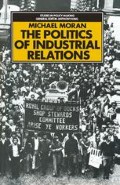Abstract
The twenty-five years after 1945 were marked by a paradox: intense dissatisfaction with Britain’s economic performance was accompanied by unprecedented economic success. For the first time in the country’s history, full employment was maintained for more than a few years; the economy grew at a rate which compared favourably with its performance at the height of the Industrial Revolution;1 and the benefits of expansion were distributed — albeit very unevenly — throughout all sections of society. Poverty still existed, but it would be difficult to find any group whose material lot had failed to improve in the quarter century after the end of the Second World War.
Access this chapter
Tax calculation will be finalised at checkout
Purchases are for personal use only
Preview
Unable to display preview. Download preview PDF.
Notes
Andrew Shonfield, Modern Capitalism, (London: Oxford University Press, 1965) p. 4
Angus Maddison, Economic Growth in the West, (London: Allen and Unwin, 1964) p. 30
Brittan, Steering the Economy, pp. 292–366; Timothy May, Trade Unions and Pressure Group Politics, (Hampshire: Saxon House, 1975) pp. 61–98, for collapses of wage pacts
Andrew Glynn and Bob Sutcliffe, British Workers, Capitalism and the Profits Squeeze, (Middlesex: Penguin, 1972)
H. A. Turner, ‘The Donovan Report’, Economic Journal, 1969, pp. 1–10
John Goldthorpe, The Affluent Worker: Industrial Attitudes and Behaviour, (Cambridge: Cambridge University Press, 1970) pp. 93–115
William Brown, ‘A Consideration of Custom and Practice’, British Journal of Industrial Relations, 1972, pp. 42–61
Richard Hyman, Strikes, (London: Fontana, 1972) pp. 26–27
Michael Silver, ‘Recent British Strike Trends: a Factual Analysis’, British Journal of Industrial Relations, 1973, pp. 71–72
A. I. Marsh and W. E. J. McCarthy, Disputes Procedure in British Industry, (London: HMSO, 1966) p. 25
A. I. Marsh, Workplace Industrial Relations in Engineering, (London: Engineering Employers’ Federation, 1971) pp. 24–25
Richard Hyman, Disputes Procedure in Action, (Heinemann: London, 1972) pp. 64–69
H. A. Turner, Is Britain Really Strike Prone, (Cambridge: Cambridge University Press, 1969) p. 34
W. E. J. McCarthy, ‘The nature of Britain’s strike problem’, British Journal of Industrial Relations, 1970, p. 230
Kevin Hawkins, ‘The decline of voluntarism’, Industrial Relations Journal, 1971, pp. 24–41
Clive Jenkins and J. E. Mortimer, The Kind of Laws the Unions Ought to Want, (Oxford: Pergamon, 1968) p. 2
Copyright information
© 1977 Michael Moran
About this chapter
Cite this chapter
Moran, M. (1977). The Crisis of Industrial Relations. In: The Politics of Industrial Relations. Studies in Policy Making. Palgrave Macmillan, London. https://doi.org/10.1007/978-1-349-02104-8_3
Download citation
DOI: https://doi.org/10.1007/978-1-349-02104-8_3
Publisher Name: Palgrave Macmillan, London
Print ISBN: 978-1-349-02106-2
Online ISBN: 978-1-349-02104-8
eBook Packages: Palgrave Political & Intern. Studies CollectionPolitical Science and International Studies (R0)

